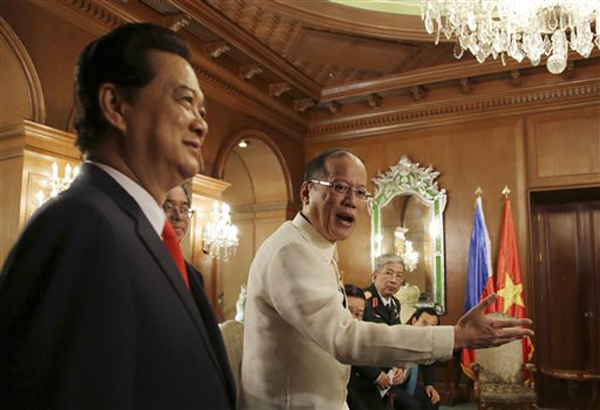
Philippine President Benigno Aquino III, right, gestures as he walks beside Vietnamese Prime Minister Nguyen Tan Dung, left, during the latter's visit at the Malacañang Presidential Palace in Manila, Philippines Wednesday, May 21, 2014. (AP Photo/Aaron Favila,POOL)
MANILA, Philippines - The territorial dispute between China and other Asian nations may reverse the course of the global economic recovery as the conflict affects shipping lanes vital to global trade, Vietnamese Prime Minister Nguyen Tan Dung said Thursday in his speech at the World Economic Forum on East Asia in Makati City.
"We ask China to observe the 1982 UNCLOS (United Nations Convention on the Law of the Sea)," Dung said, adding that Vietnam wants peace and friendship despite the row among countries in the region.
Signed in 1982, the UNCLOS is a treaty that outlines issues including navigational rights, economic rights, pollution, conservation, scientific exploration, piracy and other activities in the world's seas. It also serves as a guideline for the exercise of governments' rights with respect to the world's oceans.
Dung said about two thirds of Vietnam's trade passes through the South China Sea. China lays claim to almost the entire sea and territories within it through an expansive nine-dash line that overlaps with exclusive economic zones of nearby countries including the Philippines.
China has recently established an oil rig off the coast of Vietnam and began a reclamation project in Mabini Reef claimed by the Philippines.
Klaus Schwab, WEF founder and executive chair, said the forum is not taking sides in the territorial dispute, adding that countries need peace and partnerships in the region.
Dung's statement comes after President Benigno Aquino III welcomed heads of state and other participants in the WEF, which Manila is hosting until Friday.
Aquino boasted the reforms implemented by his administration which includes running after former President Gloria Macapagal-Arroyo, former Supreme Court Chief Justice Renato Corona and other government officials allegedly involved in the corruption and misuse of government funds.
Aquino also boasted the Philippines' rapid economic growth over the past years, the investment grade ratings the country received from various credit-rating agencies, and the Philippines' improvement in various international rankings of competitiveness and ease of doing business.
"At the end of the day, however, we recognize that the power behind all our efforts— whether in pursuing inclusive economic growth, improving competitiveness, food security, or disaster risk management— comes not from any individual, but from our people. This is why inclusive growth is not just a mantra for us; it is the yardstick by which we measure any government undertaking," he said.
Indonesian President Susilo Bambang Yudhoyono, who is attending WEF for the last time as a head of state, also attended the event's plenary session and lauded the Philippines's economic achievements in his speech. He is stepping down in October to make way for a successor.
"The selection of the Philippines as WEF host is a solid vote of confidence," he said.
Yudhoyono said Indonesia is looking at reducing its poverty rate by half from 18.6 percent to 9.3 percent, and invited WEF business leaders to invest in his country which has made an economic turnaround in recent years.
Meanwhile, Myanmar Vice President U Nyan Tun talked about the country's achievement in cutting down poverty from 32 percent to 26 percent in 2010. He said Myanmar's goal is to reduce poverty to 16 percent by next year.
"It's a long way to go, however, we are moving forward," he said.


No comments:
Post a Comment